Pets
What Can Cats Eat (21 Items discussed)
Cats are carnivores, meat eaters. Meat gives them proteins that keep their hearts strong, their eyesight, and their reproductive system healthy.
You can feed all kinds of meat (crushed, sliced, lean) to your cats, such as beef, chicken, turkey; Better cooked and fresh, such as raw or stale meat, can make your little cat feel sick.
Cat food is also an option.
However, no matter how expensive you feed your cats, they will look so innocently on your plate that you will not be able to stop yourself from sharing your food with them.
But can cats enjoy human food without upsetting their stomachs, feeling sick, or displaying behavioral problems? (What Can Cats Eat)
Learn all about “what cats eat, what cats can eat, cats human food, and what’s good or bad to feed your cats” in this one blog:
What Human Food Can Cats Eat?
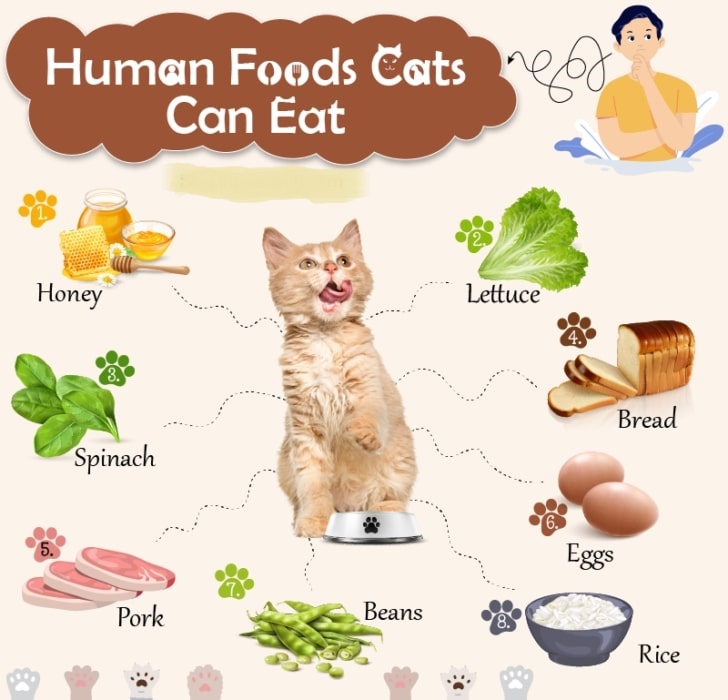
Here are some discussed foods that you can safely share with your cute little cats or even other pets. (What Can Cats Eat)
7 human foods that cats can eat:
1. Can Cats Eat Honey:
Yes!
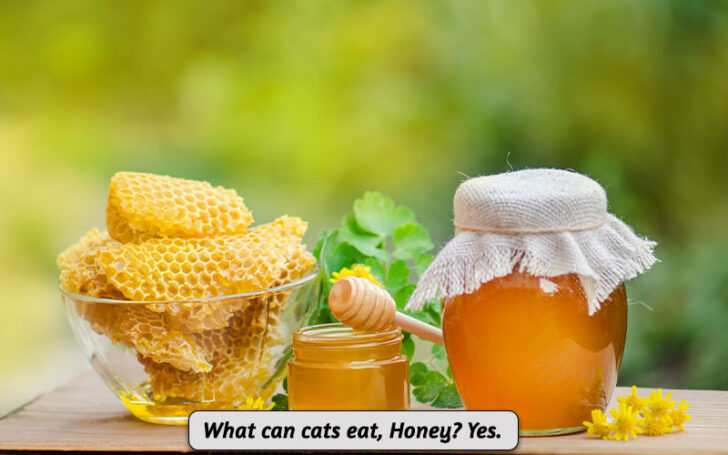
All cat breeds can eat honey in liquid or crystalline form.
Also, although cats are carnivores, they like to eat honey. He will do anything to melt your heart and share the flavor, especially while enjoying the sweet goodness in front of that sweet cat.
Read the full guide on can cats eat honey, including its health benefits, amount to feed, and precautions. (What Can Cats Eat)
2. Can Cats Eat Lettuce and Greens:
Yes!
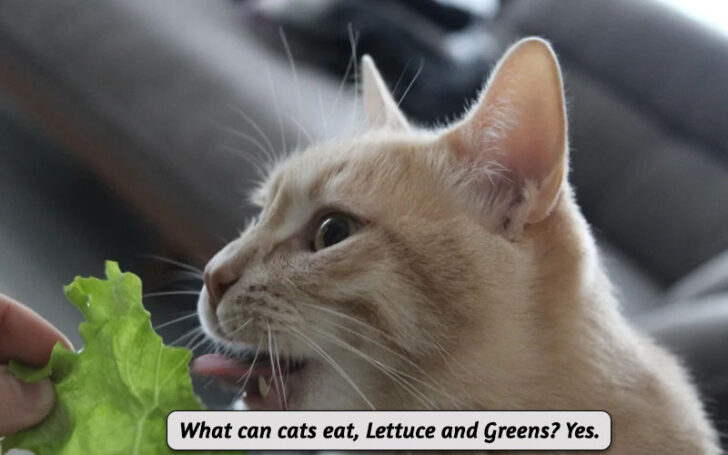
Don’t be surprised. Cats love to eat lettuce and greens as they are great food sources. Lettuce is also a source of water and bulk while feeding your cat.
Often times, you may find that your cat is missing the lettuce. The best lettuce for cats is lettuce. However, others are also suitable for feeding. (What Can Cats Eat)
Read the full guide on can cats eat lettuce, including its health benefits, amount to feed, and precautions.
3. Can Cats Eat Spinach:
Yes!
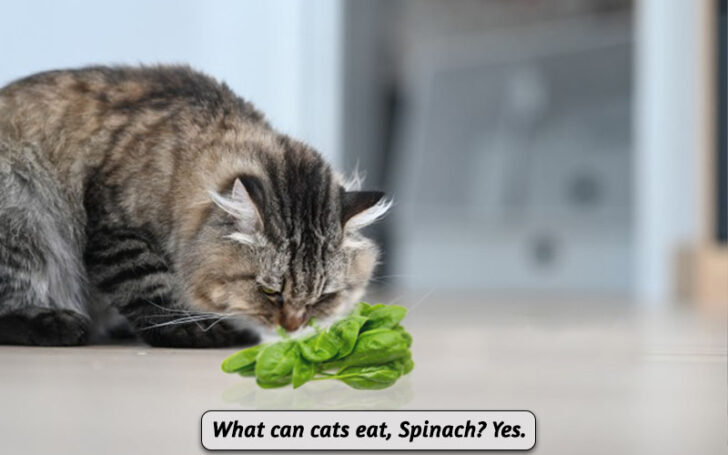
After greens like lettuce, spinach is also a safe food for your healthy cat.
If the cat has kidney problems, the calcium oxalates found in spinach can contribute to the formation of crystals in the cat’s urinary tract.
Otherwise, thanks to the low calorie content of spinach and the vitamins and minerals it contains, it is safe for healthy cats even if they consume a little more than usual. (What Can Cats Eat)
4. Can Cats Eat Bread:
Yes!
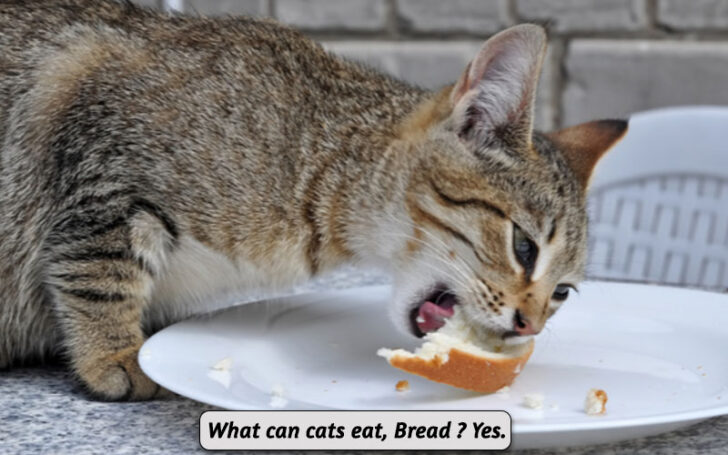
Cats can enjoy the occasional bread; However, bread does not contain the necessary protein and nutrients for cats, so bread should not be used as a substitute for daily protein-rich foods.
Give them 1 or half a piece for them to enjoy while sharing your human food with them. (What Can Cats Eat)
5. Can Cats Eat Pork:
Yes!
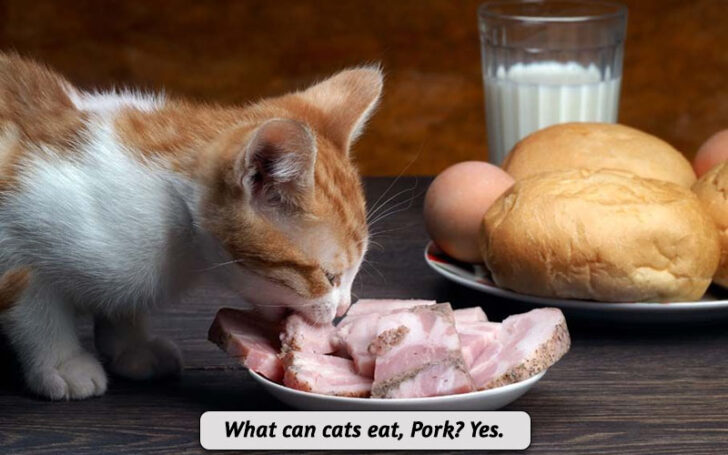
Pork is non-toxic to cats.
However, it can be fed not as a normal meal, but as an alternative to beef, chicken or mutton.
When feeding, make sure the bones are removed and the bacon or ham is thoroughly cooked as this could harm your cat. (What Can Cats Eat)
Remember, a poorly measured food intake can cause your cat to die? Read 7 signs of a dying cat.
6. Can Cats Eat Eggs:
Yes!
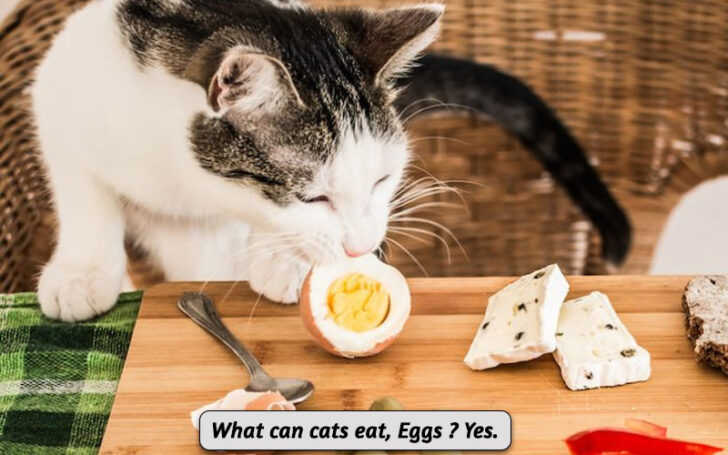
Eggs contain amino acids and proteins, and cats that are carnivorous benefit from this. However, make sure the amount is moderate. (What Can Cats Eat)
In fact, eggs contain a large amount of calories along with amino acids and proteins. It can cause your cat to become fat or obese.
So, when feeding your cat boiled or scrambled eggs or egg yolks, make sure it’s an occasional treat and don’t add it to your cat’s daily food. (What Can Cats Eat)
7. Can Cats Eat Beans:
Yes!
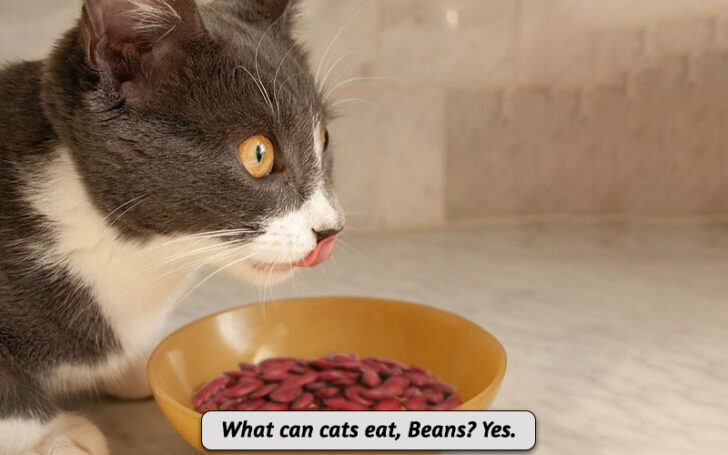
Cats can also sometimes eat different types of beans, such as bread. Why? While beans are full of nutrients for humans, these nutrients are not what your cat might need.
Feed occasionally, stick to the measured amount, and let your cat enjoy the treat. (What Can Cats Eat)
8. Can Cats Eat Rice:
Yes!
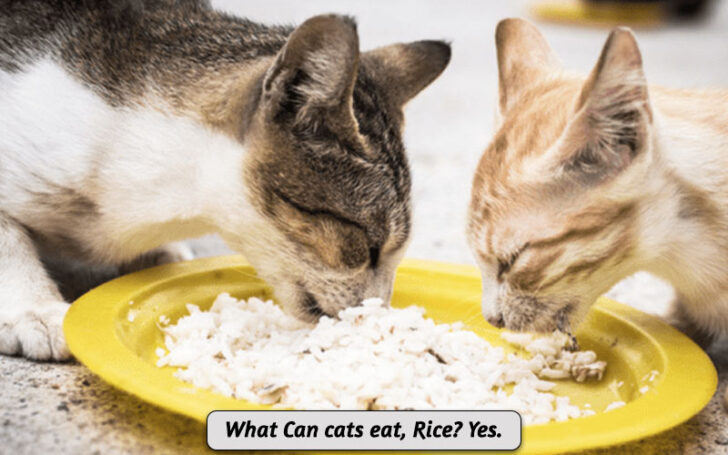
Rice should be given as an occasional treat and not as part of their diet. (What Can Cats Eat)
However, do not give them to your cats if they have been spiced with herbs.
Your little cat should only be given white rice in her favorite bowl. Do you know that white rice helps with digestive problems in cats?
Some studies report that rice can address digestive issues in cats. (What Can Cats Eat)
What Can Cats Not Eat?
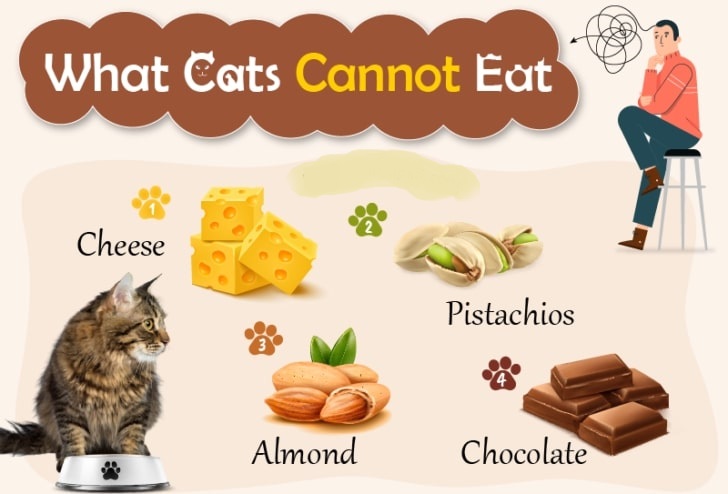
4 human foods that your cat cannot eat or that are potentially harmful to your sweet little cats can cause vomiting, diarrhea or stomach upset. (What Can Cats Eat)
1. Can Cats Eat Almond:
No, almonds are bad for cats.
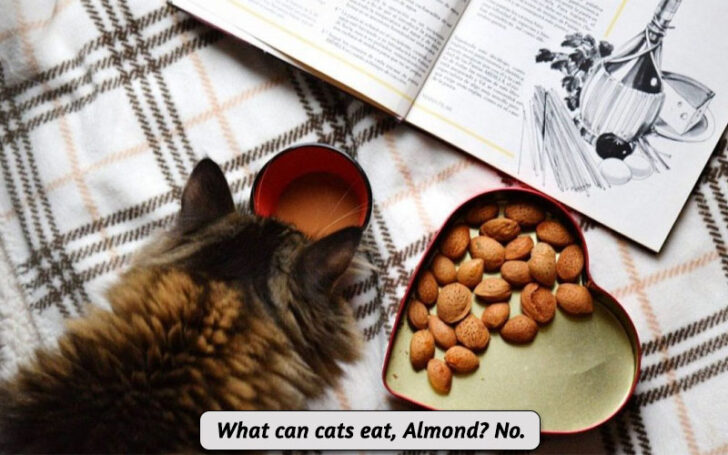
Almonds are not suitable for cats, and even consuming an almond or two can cause your cat to have an upset stomach.
The ASPCA suggests that the oils in nuts are indigestible for cats and can lead to stomach issues such as vomiting and loose bowel movement.
Read all about almond risk factors for cats by clicking this guide. (What Can Cats Eat)
2. Can Cats Eat Chocolate:
No, chocolate is bad for cats.
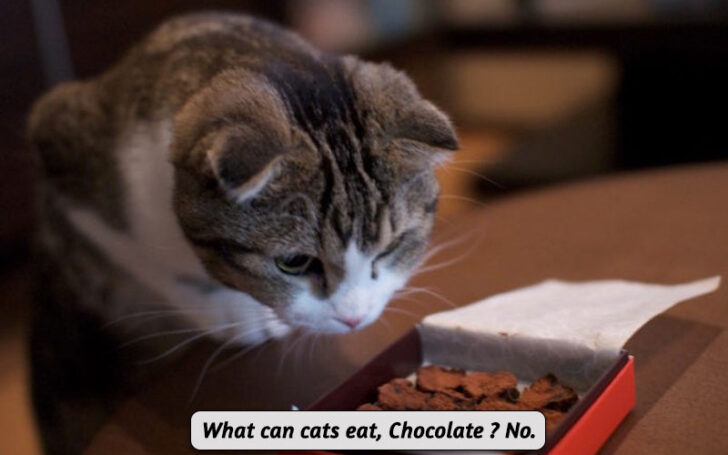
Dear pet owners, chocolate is just as toxic to cats as dogs because of some ingredients like caffeine and theobromine. (What Can Cats Eat)
Due to caffeine intake, pets may lose muscle control and experience tremors and seizures. Also, theobromine can cause vomiting, hematemesis, and polydipsia in both cats and dogs.
Therefore, chocolate is poisonous and should be avoided from feeding your cats.
A pro tip is to enjoy your sweet treats when your pet isn’t around. (What Can Cats Eat)
3. Can Cats Eat Cheese:
No.
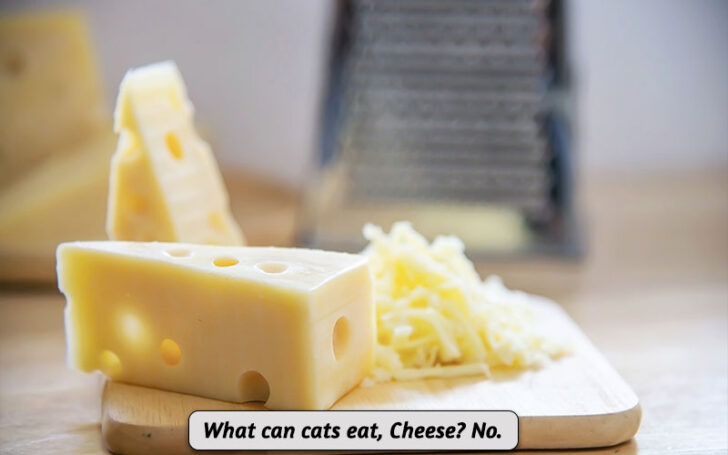
Cats should not be fed dairy products such as cheese and cream. It is not recommended to give milk even to adult cats. v
Why are cheese or milk-like dairy products bad for cats? Adult cats lack the necessary enzymes that break down lactose and cheese to aid digestion.
Feeding your cats cream or cheese can cause gastrointestinal symptoms such as diarrhea, vomiting and in some cases constipation.
Read why the Black Maine Coon is the best cat to have in families. (What Can Cats Eat)
4. Can Cats Eat Pistachios:
No.
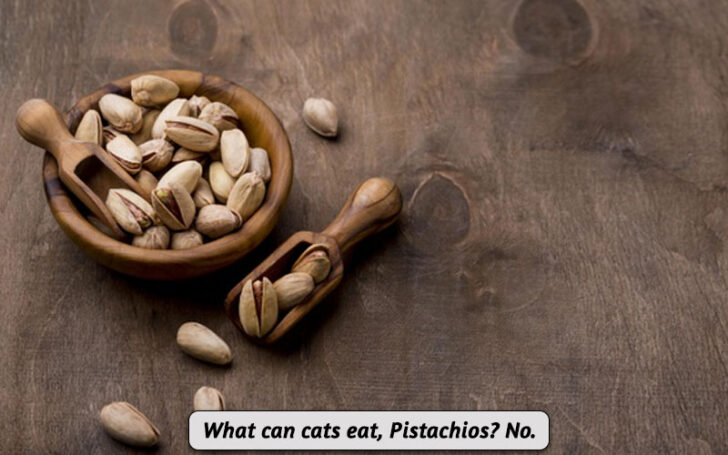
While carrots are not harmful to cats, they contain oils that can cause health problems such as gastrointestinal upset.
In addition, pistachios have a salty, nutty flavor with a hard shell. Salts are not suitable for pets, while hard shells can pose a choking risk and cause intestinal obstruction when consumed.
Therefore, it will be helpful to avoid giving nuts such as peanuts to your pets. v
Can Cats Eat Fruit?
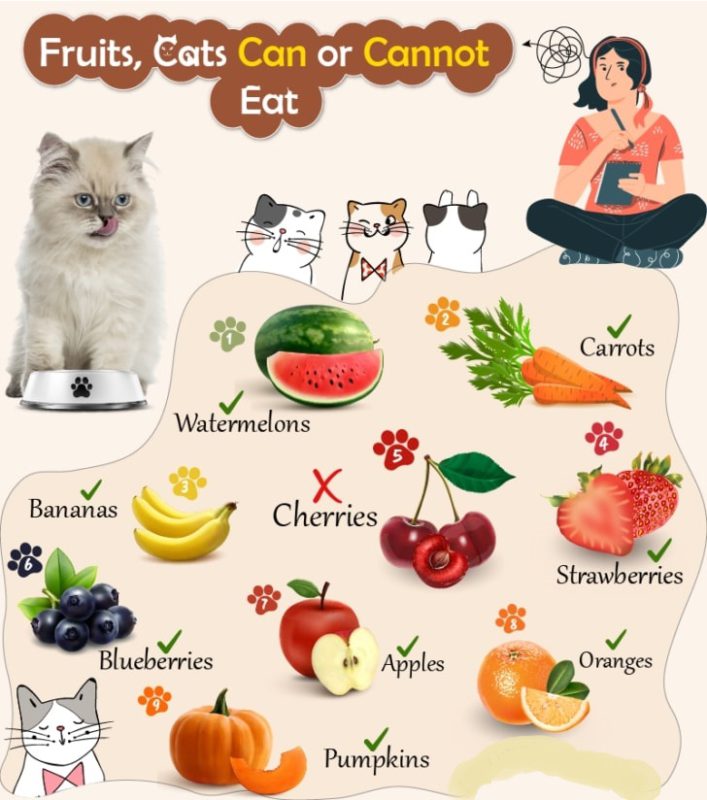
Cats are carnivores, do not diet, love meat. Meat provides furry felines with enough protein, but tea foods are also enriched with maximum protein benefits.
Therefore, cats do not need fruit or vegetables as the main ingredient in their diet for their health. However, sometimes fruits make a better alternative than high-calorie treats. (What Can Cats Eat)
So, what fruits can cats eat or not eat? Find everything here:
1. Can Cats Eat Watermelon:
Yes!
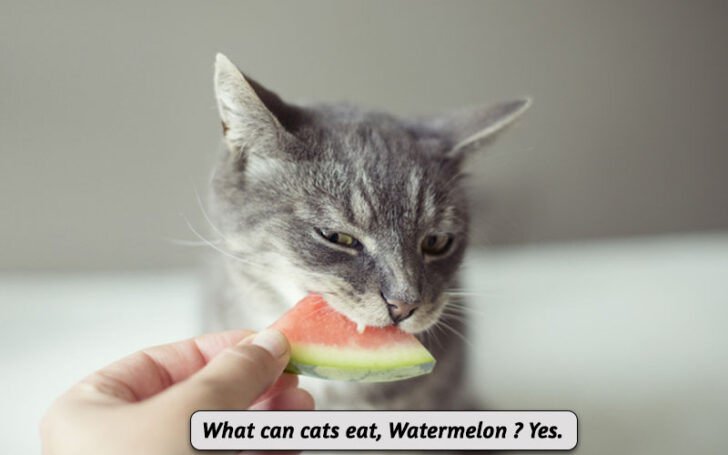
Despite being carnivores, cats do enjoy treats of sweet melon, honeydew or seedless watermelon, but these are only a small amount.
Melon is high in vitamins C and A, this fruit for pets does not contain harmful enzymes. Therefore, your little cat can safely enjoy the occasional sweet treat of watermelon. (What Can Cats Eat)
Learn more about how to safely feed watermelons to your cat.
2. Can Cats Eat Carrots:
Yes!
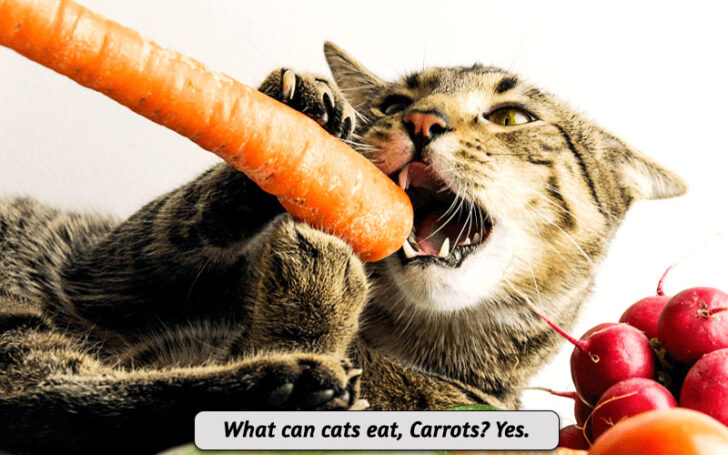
But since raw carrots can pose a choking hazard to him, they can only have a snack of cooked carrots.
When you feed any vegetables such as rice, lettuce or carrots, or even any vegetable, be sure to check that they are safe.
Also consider the quantity. Hard human foods like carrots need some cooking before serving them to your cats. (What Can Cats Eat)
3. Can Cats Eat Bananas:
Yes!
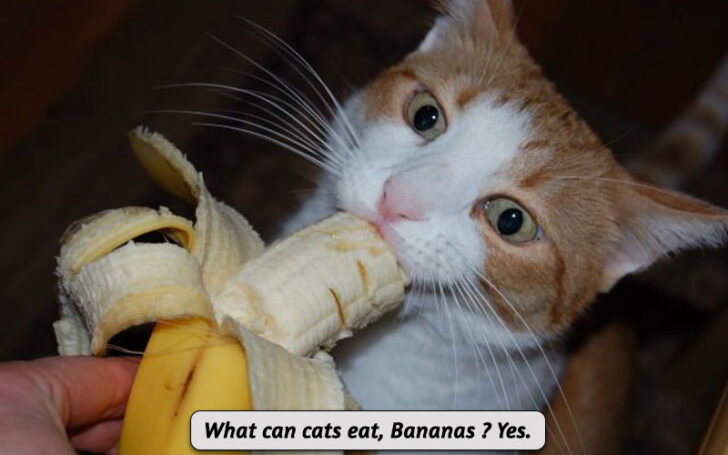
Surprisingly, bananas are just as healthy snacks for cats as they are.
Bananas are low in sugar and high in antioxidants, unlike blueberries and strawberries, their high sugar content requires you to limit the diet to treats only. (What Can Cats Eat)
4. Can Cats Eat Strawberries:
Yes!
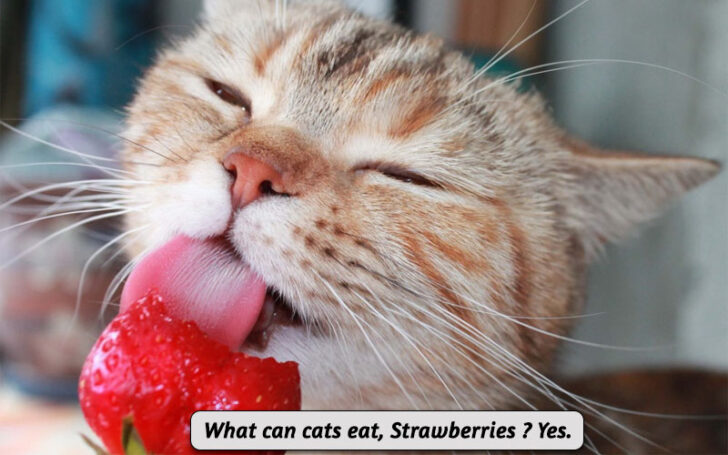
ASPCA statistics consider strawberries moderately non-toxic to cat breeds. Also, strawberry leaves and stems are toxic to cats.
To keep the cat busy with her favorite treat, be sure to keep the portion small but cut off the stem and leaves.
Removing other parts of the fruit makes it safe for cats to consume. (What Can Cats Eat)
5. Can Cats Eat Cherries:
No.
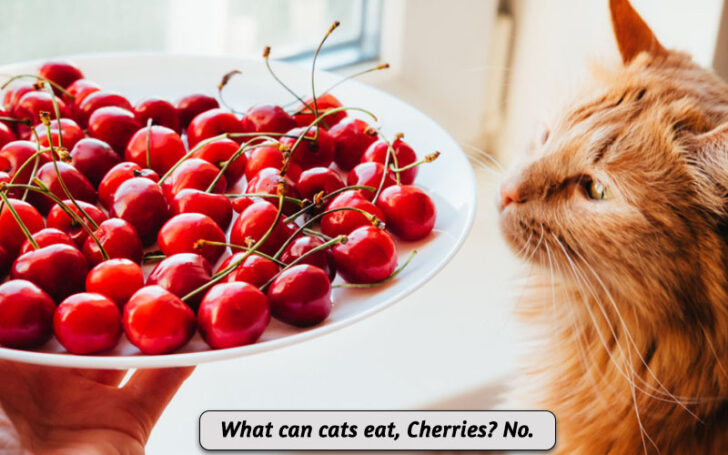
Be sure that cherries, like grapes and resins, are toxic to pets and cause kidney damage in cats and dogs.
Cherries are slightly sour in taste and toxic to cats, while other citrus and sour fruits (lemon, lime, and grapefruit) are also bad for the cat’s stomach.
Do not give cherries to your cats, as they cause stomach ache.
Read all about how harmful cherries are to your cats by clicking the link. (What Can Cats Eat)
6. Can Cats Eat Blueberries:
Yes!
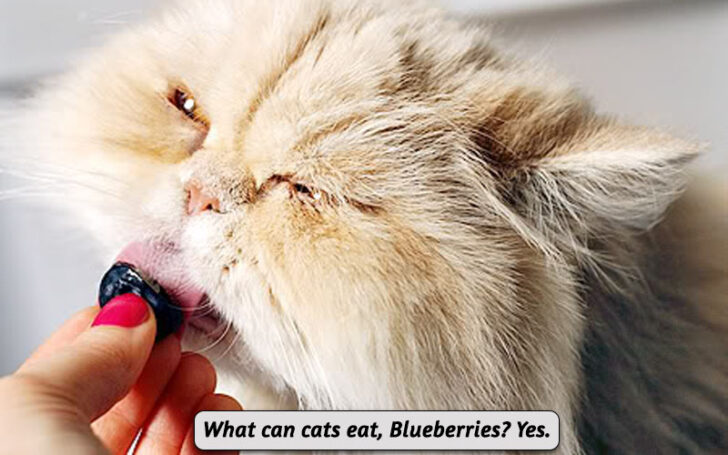
Blueberries aren’t bad for cats at all. In fact, besides being safe, blueberries are also beneficial for cats.
The antioxidants of the blueberry fruit are very good for cat health. However, you should never consider blueberries a superfood for your cat and never replace them with daily diet products.
7. Can Cats Eat Apples:
Yes, but there are some conditions.
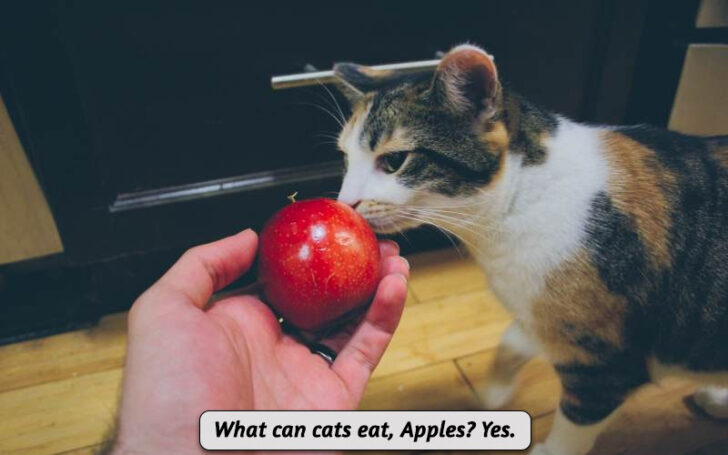
Healthy cats can generally enjoy apples without health issues, but if your cat has diabetes, it’s not meant to be the rule of thumb because of the sugar content of apples.
As a general rule, kernels or seeds, stems and leaves are not good for cats because they contain cyanide. Remove such particles from apples before serving them to your cat.
Also remember that apples should only be given as an occasional treat.
8. Can Cats Eat Oranges:
Yes!
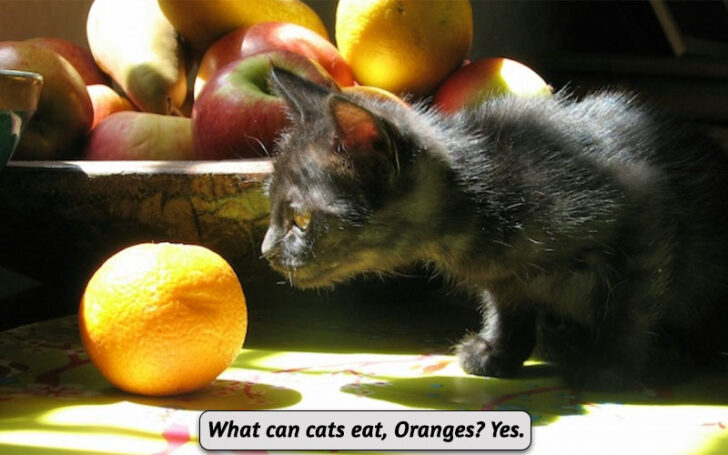
Orange is not toxic to cats, but its peel, leaves, seeds and stems are toxic to pets such as cats and dogs.
We’ve seen, dogs love oranges, but cats generally don’t like to eat oranges.
If your cat is different and still interested in eating oranges, be sure to remove the seeds, rind, and other rind from the orange before serving.
Read all about the different types of oranges by clicking the link.
9. Can Cats Eat Pumpkin:
Yes, but there are risks.
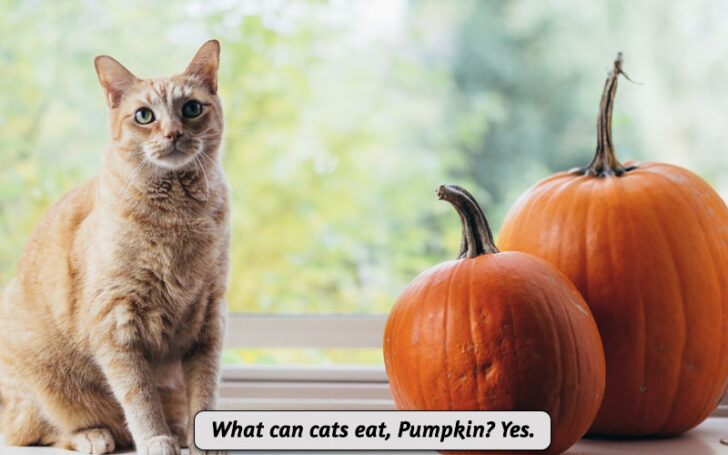
Pumpkin is a safe fruit for cats to consume if the amount is moderate, but eating too much pumpkin can cause diarrhea in cats.
However, the condition may not be severe.
If you notice that your cat is vomiting due to eating pumpkin, skip a meal or feed a small amount.
In serious cases, consult a wet.
Bottom Line:
All in all, sharing your food with cats isn’t bad, but problems arise when you unintentionally share and play with your little pet’s health.
To never let that happen, consult the 21 items we discussed before giving your cat any treats.
Did you find this blog helpful? let us know.
Also, don’t forget to pin/bookmark and visit our blog for more interesting but original information.